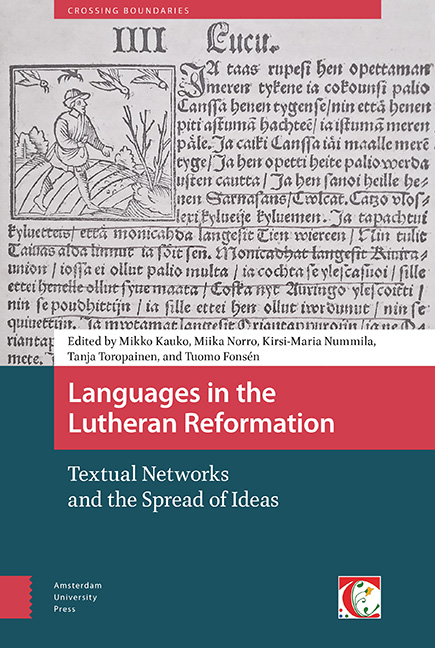Book contents
- Frontmatter
- Contents
- List of Figures and Tables
- Preface
- Introduction
- Part I The Reception of Luther's Ideas and their Influence for the Development of Written Languages
- Part II Effects of Bible Translations on the Evolution of Written Language
- Part III Reuse of (Catholic) Texts after the Reformation
- Part IV Language Contacts and Loanwords
- Index
4 - The Czech Language in Confessional Clashes of the 16th Century
Published online by Cambridge University Press: 21 November 2020
- Frontmatter
- Contents
- List of Figures and Tables
- Preface
- Introduction
- Part I The Reception of Luther's Ideas and their Influence for the Development of Written Languages
- Part II Effects of Bible Translations on the Evolution of Written Language
- Part III Reuse of (Catholic) Texts after the Reformation
- Part IV Language Contacts and Loanwords
- Index
Summary
Abstract
This essay discusses the influence of the Reformation period on Standard Czech. The Bible was translated into Czech as early as the mid-14th century, and by the time of the Reformation the language was rich, highly developed, and well-established. Protestant views had its Hussite predecessors in Bohemian Lands, and Luther's ideas also reached the area early. All in all, the religious situation in Czech lands was very confused in the 16th century, and although Luther's texts were translated, neither his Bible nor his New Testament were ever translated into Czech. Ultimately, therefore, his direct influence on Bible translation and the development of the written Czech was limited. Instead of the Lutheran Bible, a different model for written prestigious Czech was offered by the Brethren Bible, translated at the end of the 16th century.
Keywords: Middle Czech, confessionalization, biblical translations
Introduction
The situation in the Czech Lands of the 16th century made these territories a peculiar confessional and linguistic laboratory. This was due to the unique configuration of both language-related and historical conditions and is reflected in the development of the Czech used in biblical translations, i.e., the most prestigious layer of language, and in confessional life generally. Exploring this in greater detail through comparison of attitudes to language and confession-bound Czech vocabulary with respect to the Lutheran Reformation will be the main focus of this chapter. I argue that the conditions for growing confessionalization generally improved, especially from the 1580s, with the climax coming in the 1610s, and that it is most visible in the case of the Unity of the Brethren, which, after a certain attraction to Lutheranism in the first half of the 16th century, gradually approximated Calvinism in the remaining decades before 1620. Quite paradoxically, the orthography of this tiny Protestant minority, confessionally an original Bohemian product, asserted itself as the model for all prints with prestigious functions for the next two centuries, as did its language, best represented by their Six-Volume Kralice Bible translation.
Coming about a century after the Hussite Wars, the Lutheran Reformation brought further division in confessional terms.
- Type
- Chapter
- Information
- Languages in the Lutheran ReformationTextual Networks and the Spread of Ideas, pp. 105 - 128Publisher: Amsterdam University PressPrint publication year: 2019
- 1
- Cited by



